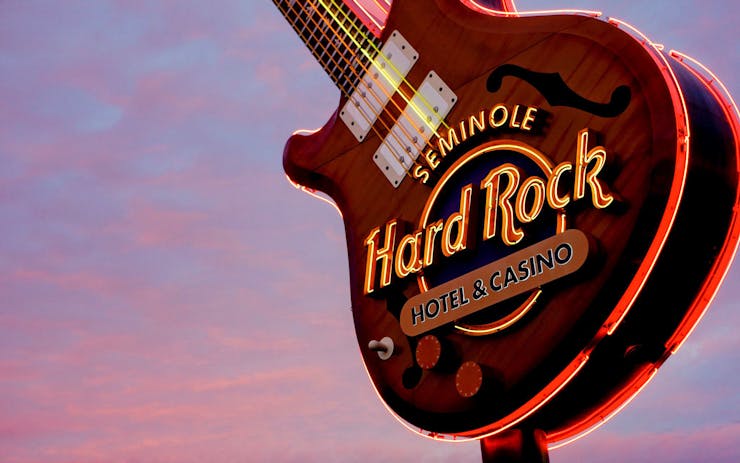A potentially landmark partnership between a cannabis advisory firm and a business owned by former Seminole Tribe chairman Jim Billie is looking to lead the way for tribes hoping to get into cannabis-related industries.
Billie and Electrum Partners see a future industry 'bigger than bingo.'
On Tuesday, Nevada-based Electrum Partners announced a partnership with MCW, a company owned by Billie, the longtime Seminole leader who lost his official tribal position in October 2016. The Seminoles, one of the most well-known names in Indian Country, currently own and run five Seminole Casinos in addition to two Hard Rock Hotel & Casino facilities in Florida.
In announcing the deal, the two partners said they aim to use the business edge of tribal sovereignty to create an industry “bigger than bingo.”
Adapting blueprints from the billion-dollar Native American gaming industry, the two companies believe this is “just the beginning” of what could be an important tool for expanding legalized cannabis in America—especially in states with restrictive regulations.
“As the fastest growing industry in the United States, with estimated value in the tens of billions, we are bringing the benefits of our tribal sovereignty to the cannabis industry,” said Billie. “And the cannabis industry leadership is partnering with us to enable the next huge economic development opportunity for the Native American Community.”
Those benefits include the freedom from federal tax obligations, and the ability to work around limiting licensing practices. According to Electrum president Leslie Bocskor, that give tribes an edge to develop business ventures in any state that has a regulated cannabis industry. In states with established markets, Bocskor said tribes and their partners will gain an “almost unfair advantage” due to the lack of tax obligations, and that those conditions will be passed on to business partners beyond the sponsoring tribe.
“How do you compete with somebody that is essentially paying 60 percent less for their product than you are?” Bocskor said. “You can split that 60 percent between the tribe and the operator that partners with them. It’s an incredible, incredible tool.”
Room for Movement in MMJ States
In other states like New York, which only currently licenses five companies for regulated distribution, Bocskor said this sort of partnership would go beyond simply offering tax advantages. It would open the door for a increased development and competition in state-regulated cannabis markets.
In states with limited licenses, 'Native Americans can establish a presence in the industry.'
“In the states that have limited licenses, in any fashion, that means that Native Americans can establish a presence in the industry in that state,” he said. “So now that means Native Americans can find partners that are the very best-of-the-best and want to be in those jurisdictions.”
With the help of MCW, and the leadership of Billie, the partnership has a chance to be the first of its kind to find a footing in the cannabis industry. And when it comes to paving the way for new Native American industries, Billie brings a storied history of setting legal standards and paving the way for the economic development of tribes.
The passage of the Indian Gaming Regulatory Act in 1988 eventually led to a dispute between the Seminole Tribe and the state of Florida, with Billie spearheading the effort to have the case heard by the United States Supreme Court. The court found in favor of the tribe’s right to apply sovereignty to gaming operations. Thanks to that decision, the tribal gaming industry has grown into a $27 billion industry, or more than twice the annual revenue of the National Football League.
Hard Rock International
In 2007, the Seminole tribe further established itself as an industry leader when it acquired the Hard Rock International brand. Billie is now looking to make cannabis the next “game changer” through his partnership with Electrum.
“That’s why when chairman/president Billie said it’s “bigger than Bingo,” most people don’t know what that means,” Bocskor said. ““The only reason that exists is because of what president Billie did… That precedent is what allowed the creation and the birth of gaming industry on the national basis, and those precedents set the basis for doing this.”
“It’ll probably be the biggest economic development opportunity for a Native American community that we’ve ever seen.”
This partnership, like other Native American led cannabis initiatives, will seek to put into practice the guidelines of the Wilkinson Memo, which applied previously suggested guidelines for regulating legalized cannabis to Indian Country. But unlike other proposed partnerships between tribes and cannabis professionals, Bocskor said this partnership will only work on projects within states that have regulated cannabis industries, and that all parties involved will “meet and exceed” regulations to keep from causing any turbulence with state and federal authorities.
Looking at Hemp, Too
The versatility of the cannabis industry is also another factor that Bocskor believes this partnership can have such an impact. Although medical cannabis projects are not part of the project scope at this point, Bocskor said he wants tribes to have access to the resources and education to explore all opportunities.
That includes one unique area of growth that Bocskor is interested in exploring: industrial hemp.
With the literal and operational functionality of hemp-based products, many in the industry see hemp as a possible replacement for paper and carbon-based plastics. Bocskor said that tribes with the land to explore industrial hemp operations can not only generate significant revenue, but they can also play a significant role in helping the environment.
“Potentially, you could have the largest carbon-negative industry in the world,” Bocskor said, “and we would love to see that interest that we’ve already gotten expand.”






